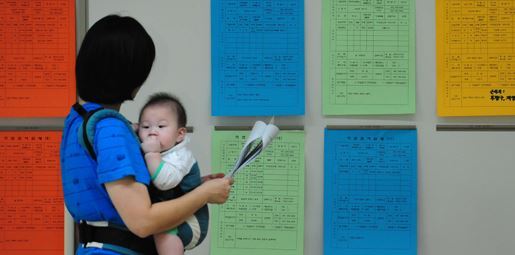Twice as many women in Seoul experience career disruption than men, while the wage gap between them is increasing, according to the Seoul Metropolitan Government.
A total of 34.2 percent of all Seoul women experienced career disruption as of this year, accounting for 67 percent of all Seoul citizens whose careers were disrupted at least once in their lives.
Meanwhile, the wage gap between men and women in Seoul has been increasing since 2008. A working man in Seoul on average made 920,000 won ($830) more than his female counterpart in 2008.
Last year, men on average made 1.09 million won more than women a month.
Sixty-one percent of the women whose careers were disrupted said they left their positions for family-related reasons, while 7.8 percent said it was because of child care.
A total of 34.2 percent of all Seoul women experienced career disruption as of this year, accounting for 67 percent of all Seoul citizens whose careers were disrupted at least once in their lives.
Meanwhile, the wage gap between men and women in Seoul has been increasing since 2008. A working man in Seoul on average made 920,000 won ($830) more than his female counterpart in 2008.
Last year, men on average made 1.09 million won more than women a month.
Sixty-one percent of the women whose careers were disrupted said they left their positions for family-related reasons, while 7.8 percent said it was because of child care.

Four percent said they had to quit their jobs to fulfill domestic chores including cooking and cleaning.
Also, more Seoul women are working as contract workers with limited job security than men, according to the city government.
While 45.2 percent of working women were employed in contract positions last year, only 29.6 percent of employed men were working under contracts.
Among female contract workers in Seoul, 69 percent never received higher education, while 28.5 percent did not graduate from high school.
Seoul women aged 25 to 29 were employed the most of all age groups last year, while those aged 35 to 39 had the highest unemployment rate due to child care and other family responsibilities.
Of Seoulites aged 35 to 39, 92.8 percent of men were employed last year, but only 58.2 percent of women were working.
The city government also found that women who never received higher education tend to return to work after experiencing career disruption, but many of those who attended university choose not to return to work after parental leave.
The Ministry of Gender and Family this week announced its plan to encourage more women to return to work after maternity leave, including establishing more “returnship” programs, which offer women whose careers were disrupted an opportunity to be recruited after going through a training period at potential employers.
By Claire Lee (dyc@heraldcorp.com)







![[Hello India] Hyundai Motor vows to boost 'clean mobility' in India](http://res.heraldm.com/phpwas/restmb_idxmake.php?idx=644&simg=/content/image/2024/04/25/20240425050672_0.jpg&u=)









